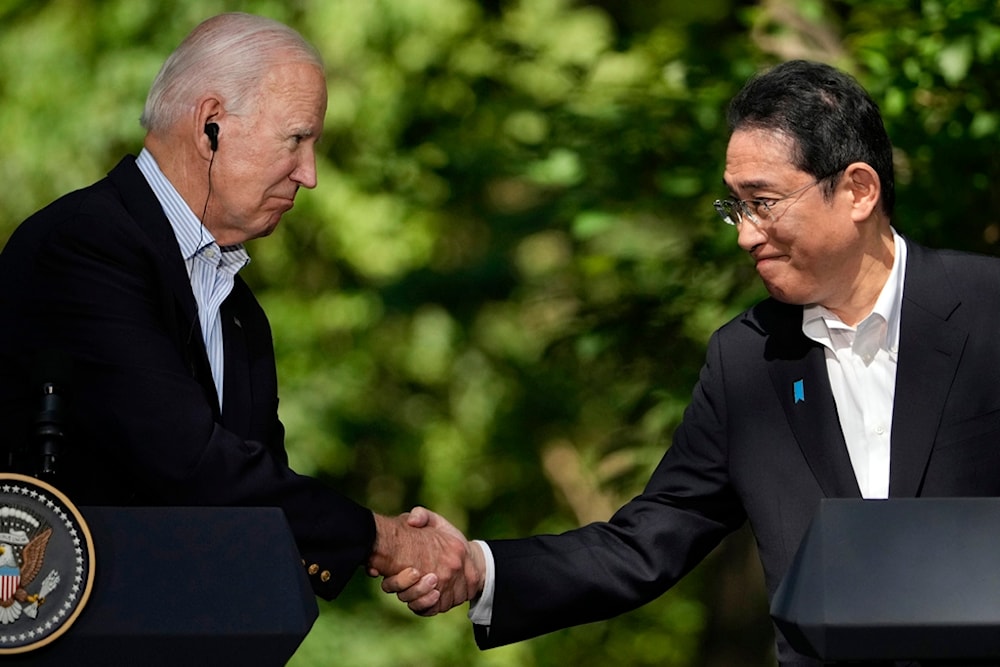US, Japan discuss plan to build high-speed rails in Texas
The project stands at a hypothetical $30 million amid expected opposition and political hurdles.
-

US President Joe Biden, left, shakes hands with Japan's Prime Minister Fumio Kishida during a joint news conference with South Korean President Yoon Suk Yeol, not visible, on August 18, 2023. (AP)
US President Joe Biden is seeking to revitalize a plan to build high-speed train rails spread across Texas, employing Japanese bullet trains. Reuters reported that the president was expected to discuss the project with Japanese Prime Minister Fumio Kishida during his visit to Washington this week.
Both officials could publicly advocate for the Texas project following their Wednesday talks, which could be overshadowed by another Japanese-US deal entailing the sale of US steel to Nippon's Steel.
The last time a Japanese official made an official visit to the United States was nine years ago. As Kishida's visit marks a milestone in Biden's governance, the move signifies the development of bilateral economic relations between both countries.
On Wednesday, Kishida and Biden would discuss the rails project connecting Houston and Dallas, sources informed on the topic stated. However, the project currently remains a hypothetical pursuit rather than a fully developed plan, rendering a public announcement unlikely.
Private benefit trumps societal development
The project itself would need between $25 million to $30 million to mature but is currently being challenged in Texas and Congress, despite the benefits it would bring.
The United States has received several proposals for the development of railways across Texas. This is due to the extensive distances between its cities and towns, the wide commuter population, and the lack of transportation services.
None of the previous discussions were materialized due to political contending, the complex structure of land ownership, and increasing costs.
However, if the project is supported by both Biden and Kishida, it would unlock money from the Federal Railroad Administration, other Department of Transportation funds, and massive private investments.
It would also cut commute times shorter to 90 minutes, instead of 3 hours and a half.
Opposition from US Republicans
Japanese state-owned financial institutions, such as the Japan Bank for International Cooperation, have extended loans to support the development of the project, which aims to acquire bullet train technology from Central Japan Railways Company.
Advancement in this sphere would align with the goals of the Biden administration, which has been advocating for environmentally friendly policies and investment in railway infrastructure.
However, this initiative is likely to face criticism, particularly from Republican lawmakers. Historically, they have opposed the allocation of public funds for rail projects, and currently, they are against using these funds for the reconstruction of Baltimore's Francis Scott Key Bridge, which was damaged by a cargo ship last month.
The potential endorsement from leaders comes after Biden's objection to Nippon Steel's proposal to acquire US Steel Corp, insisting that it should stay under American ownership. Biden, who approved a $1 trillion infrastructure package in 2021, allocating $66 billion for railway initiatives, is set to go head-to-head with Donald Trump in a rematch of the presidential election in November.
As voters prioritize the economy as their primary concern, President Biden has been advocating for government-supported construction projects, which his advisors assert could generate employment opportunities and alleviate inflationary pressures.
Biden's approval rating in free fall over handling of war on Gaza
As Biden's presidency walks a thin line with the approach of the elections, the current president is scurrying to find projects and campaigns to ensure his win, specifically amid a free-falling popularity rating.
Biden's complicity in the war on Gaza has further contributed to his disapproval rating with 22% saying the President was greatly responsible, 23% saying "fairly" responsible, and 21% saying "somewhat responsible".
Over a quarter (23%) of Generation Z voters (born between 1997 and 2012) held Biden primarily accountable for the humanitarian crisis, and 22% of millennials (1981-1996) blamed him the most.
Osamah F. Khalil, a US foreign relations and Middle East expert, told Newsweek that youth and minorities, in particular, believe Biden's administration is complicit in the genocide.
"He appears to be avoiding college campuses. We haven't seen much of Kamala Harris, the vice president, either," Khalil noted.
Khalil added that despite "wringing Netanyahu's hand" in public, many voters believe the current administration is "absolutely hand in glove with what the Israelis are doing and what Netanyahu is doing."
Read more: US court to listen to case on Biden's complicity in Gaza genocide

 4 Min Read
4 Min Read








